Talking Heads: Alastair Campbell Meets Gary Neville
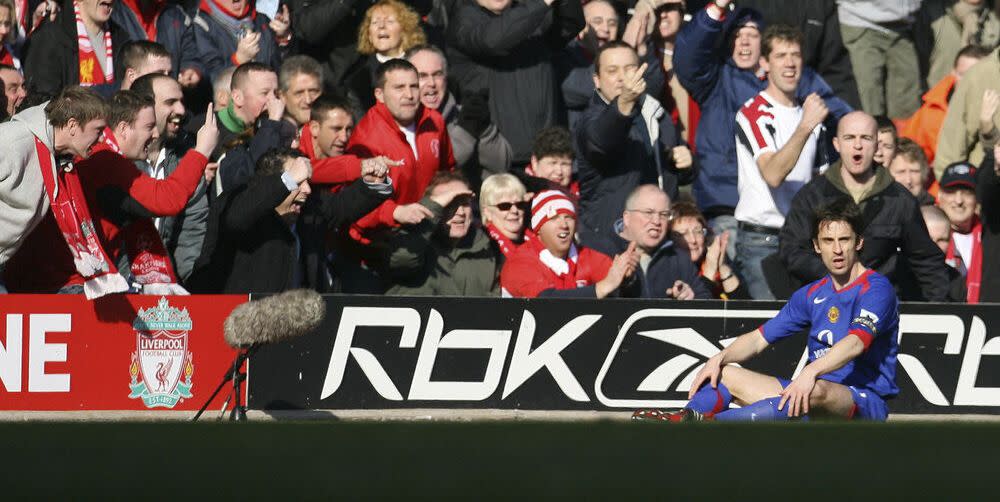
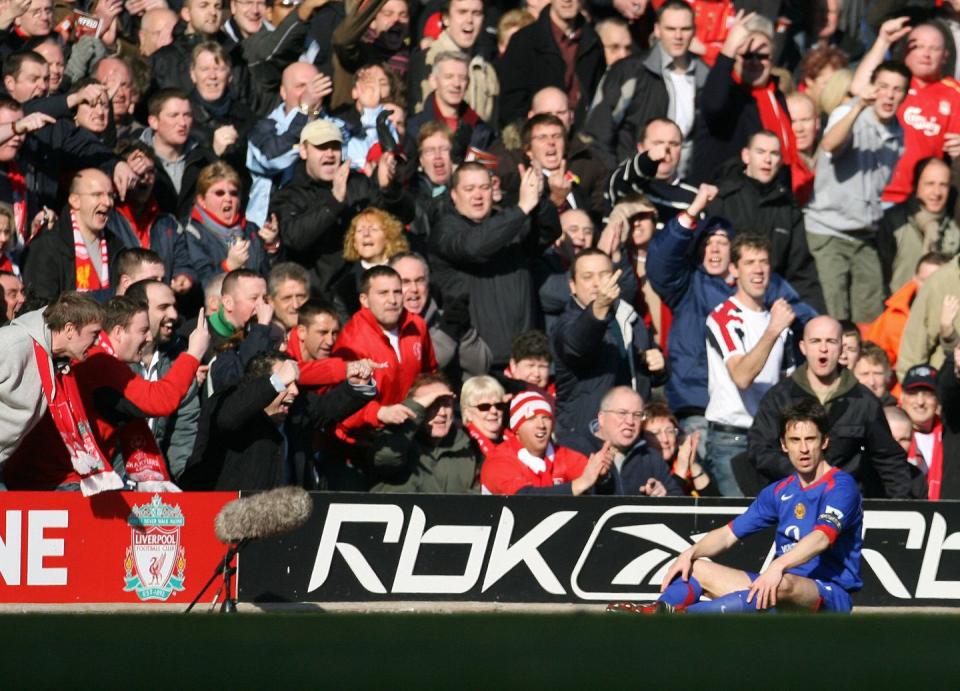
I like to think I know how to pack a lot into a day, keep busy and live a full, varied life. But for Gary Neville, my god, ‘busy’ – one of the kinder nicknames given to him by his former Manchester United teammates – doesn’t even come close. Businessman, property developer, hotelier, university boss, football club co-founder and co-owner, pundit, columnist, author, campaigner, husband and father. He is rarely off the TV and, as one of Sky Sports’ expert co-commentators, he is widely viewed, in a crowded field, as the best pundit in the country. He is also rarely out of the news, not least because he has views about pretty much everything, regularly communicating them to his 5.4 million followers on Twitter, and has been straying further and further into the political arena, calling out the failings of the Tory government and becoming a vociferous supporter of Labour under Keir Starmer. Inevitably, that has led to speculation that he will become a Labour MP, or perhaps Mayor of Manchester. His current stance is: ‘No.’ Push a little, however, and ‘not yet’ feels closer to the mark.
I, for one, hope he does eventually go down the political route. He has known both a working-class childhood and a multimillionaire sportsman-turned-businessman lifestyle. He has deep convictions and courage in his expression of them. He is articulate and smart and cuts through to the public in a way all too few politicians appear able. We chatted a day after former Cabinet minister Matt Hancock entered the reality TV jungle, just the latest chapter in what Neville calls the ‘nightmare’ of UK politics since Boris Johnson became Prime Minister. Johnson and Hancock, I learn, are to a large extent responsible for the radicalisation of Red Nev.
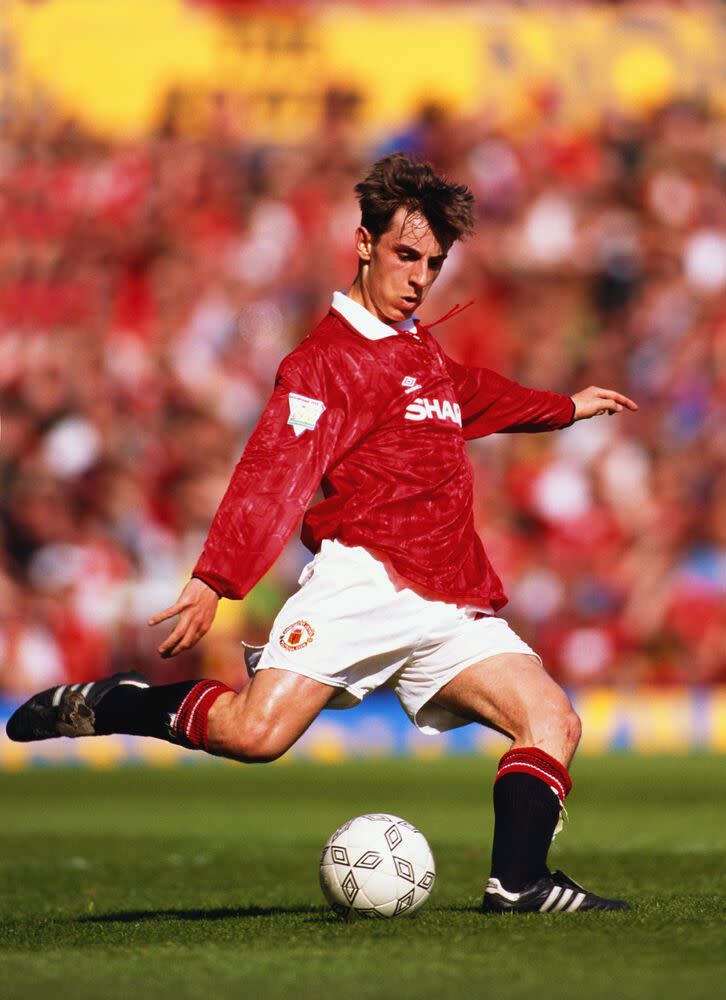
His motto is ‘attack the day’ and he lives by it seven days a week. He likes new challenges and is not afraid of failure. He admitted to a rare attack of nerves ahead of sitting in the presenter’s chair for an episode of Have I Got News For You, where Ian Hislop gave him a good old Hislopian rinsing for taking the BeIN Sports’ shilling to commentate at the World Cup in Qatar. His biggest failure, by some distance, was his brief stint managing Spanish side Valencia, which settled him in his view that, despite all he learned from Sir Alex Ferguson when playing under him, and helping United win 20 trophies, he would never be a manager. As you shall see, however, he does not think that his failure should lead anyone to question his expertise as a commentator. Or, indeed, anything else.
AC: Now Gary, you are probably the most talkative person on the planet, so just to remind you, this is a Q and A, not just A.
GN: (Laughs.) Don’t worry. I’ve got the brief. I’m in short and snappy mode.
AC: First question, then: when you were a player, how would you define the balance between the physical and the mental in what made you a success?
GN: I would say up until the age of 24, 100% of my attention was on the physical. I never even considered the mental side of things. The turning point was the Club World Cup in 2000, against Vasco da Gama. Google ‘Neville Vasco da Gama’ and you’ll see it. Scholesy [Paul Scholes] calls it Fiasco da Gama. I made two terrible mistakes, gave away two goals, we lost and, to be honest, I went under for about six months.
AC: How did you get back up?
GN: I had 10, 12 sessions with a psychologist. It was the first time I recognised that mentality was really important and could impact performance. I was also going through a break-up in my private life, so that didn’t help. It was a tough period and from that moment I have always understood that the mental side is important. So now I would say it is about 50-50.
AC: What did you get out of seeing a psychologist?
GN: Really simple coping mechanisms, which helped me get perspective. He would say to me, if I have a bad day, did I expect that every day of my life would be good? Did I think that I would win every game I played in? Would every meal I ate be wonderful? Also, he would get me thinking about how much I had in my life compared with others. Simple things. I use them now. Not every business decision I make will be great, I won’t always get my punditry right, I am going to have the odd bad meal. Accept it, move on.
AC: What would have happened if you’d gone to Fergie [United manager Sir Alex Ferguson] and said, ‘Boss, I am struggling with my mental health.’ Would he have got it?
GN: (Laughs.) I would never have gone to him with that.
AC: Why not?
GN: You just didn’t. I wouldn’t have said it to him, I wouldn’t have said it to my dad – my two heroes, my father figures. But no, I would not have said I was down. I wouldn’t have said it to anyone in the dressing room. Football dressing rooms are a fierce place.
AC: But you had real friends in that dressing room.
GN: I know, but we got each other through tough times with humour, not crying with each other and pouring our hearts out.
AC: Even if you felt like doing it?
GN: The only time was the 1998 World Cup when [brother] Phil, [United teammate] Nicky Butt and Gazza [Paul Gascoigne] got left out of the squad and [manager] Glenn Hoddle sent them home. It was a massive event in the camp, a real feeling of doom. Phil had been in tears, Gazza in tears, grown men crying. It hit us all badly. We had our own rooms, but they had twin beds, and Scholesy and I were lying on these two beds and we just talked and talked about how it made us feel. But that was the only time.
AC: Today, you part-own a club, Salford City. If a player thought you were someone he could bring problems to, would that happen? Have things changed?
GN: I have had a player, and a member of staff, who have brought me their problems. We also have full-time counselling support. It’s the same at the university [Neville co-founded University Academy 92 with Lancaster University and Ryan Giggs, Paul Scholes, Nicky Butt and brother Phil]. We have three or four full-time in counselling support. I actually think, Alastair, that the only way the government is ever going to get on top of this mental health crisis is to place the responsibility on business. If you have more than, say, 30 staff, then you should be required to provide proper support. And for smaller companies, they can buddy up with others. It’s the only way we will get round it. It has to be an obligation.
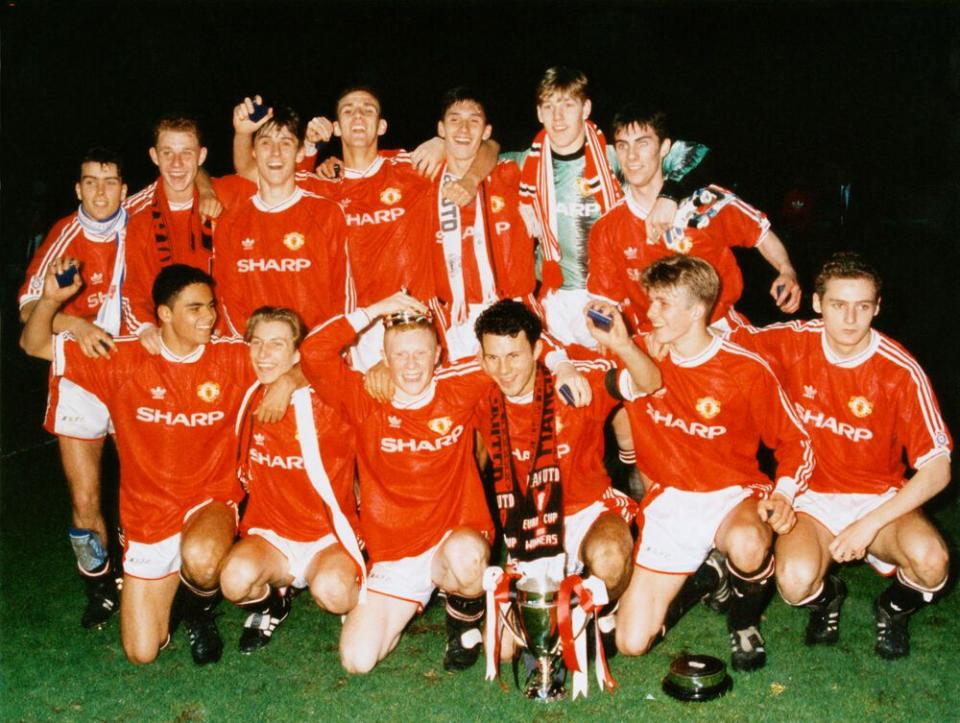
AC: Have you ever had what I would define as mental ill health?
GN: I would not necessarily say mental ill health, but I would say that for six months after that Vasco da Gama game, from January to July 2000, I remember not wanting to play, not wanting the ball to come to me on the pitch, feeling down and horrible all the time. We won the league at Southampton that year and I didn’t even celebrate. I felt empty. I call it a period when I was not at my best, but maybe it was mental ill health. I did end up seeing the psychologist after I had been to see the doctor at the club, and he said, ‘I think you should see someone.’
AC: Were you not worried he would talk to Fergie about it?
GN: The footballer’s room of trust is with the physio and the doctor. I trusted him. Looking back now, and knowing what I do as a business leader, I would reckon that if he did tell him, it would be in a way that was good for me. Maybe go to Sir Alex or one of the coaches and say, ‘Gary is not himself at the moment, maybe go easy on him.’ I don’t know.
AC: Would you have worried that if Fergie knew about it, he would mark you down or perhaps even drop you?
GN: I don’t know if the doctor ever said anything. He did say, ‘This stays between us.’ But if he had said, ‘I will have to tell Sir Alex,’ then I would have left the room and said, ‘No way can you do that.’
AC: Let’s say you’re commentating and Trent Alexander-Arnold is having a nightmare, so you rip into him in the punditry. Do you ever worry he might be going through something similar to what you did?
GN: A better example is Harry Maguire, or Marcus Rashford last year around the time of all the political stuff. There was no doubt they were going through bad periods, so you come off them a bit, you temper the criticism, you make it measured. But if they make a big mistake in a big game, you have to identify that. You can’t just say, ‘Oh, he must be having a bad day.’ They are playing for big clubs in a big boys’ game. Like you in politics. You were supporting Tony [Blair] and the Cabinet, and if they make a mistake you call it out, you tell them they are in the big league, they have to take the criticism, irrespective of mental health. Like when I went on Have I Got News For You recently and I took a few punches. You roll with it and go again.
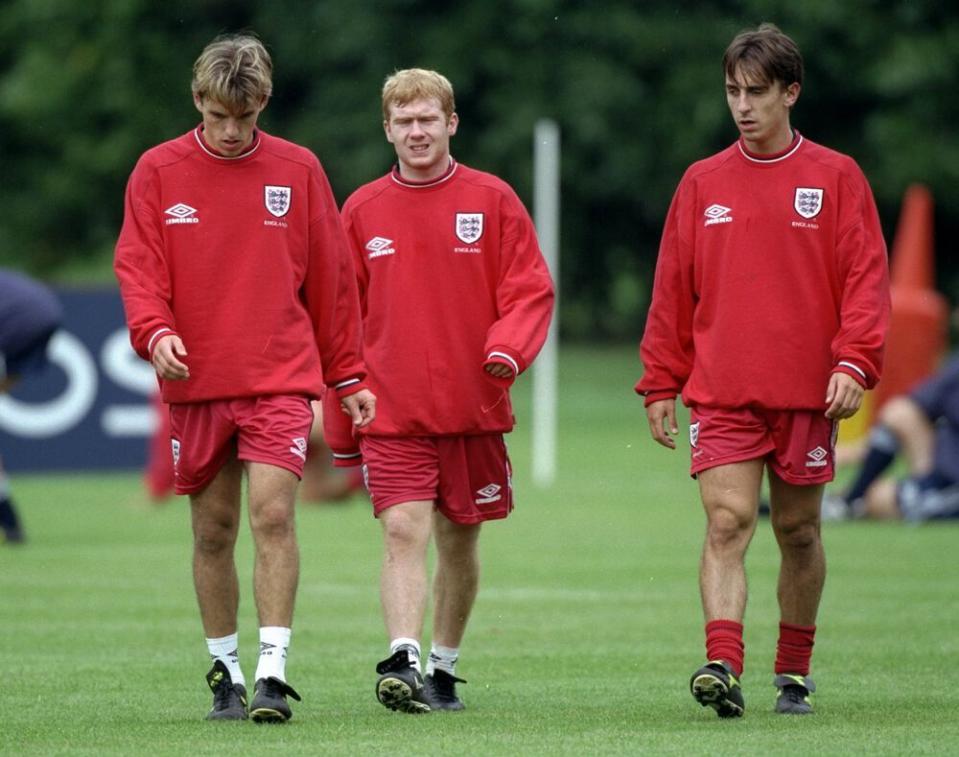
AC: The four stages of your life so far have been: player, pundit, manager, businessman. Put them in the order that has given you the most satisfaction.
GN: I don’t like to say player best of all because I have worked so hard to move on, but how can I say anything else? Playing for the club I love at the level I did, it has to be player first. But I would put business next, because I love working with the teams I build, then pundit and management last.
AC: Is your management career over for good?
GN: Absolutely. I will never manage again. I should never have done it in the first place.
AC: Why?
GN: It was ego. You know managers, Alastair. They are obsessive, committed, totally dedicated.
AC: So are you, no?
GN: I am obsessively dedicated to my businesses and business development, to the university, to my media career. I work on them all the time. But I never want to coach another player, I just don’t want it, it’s not me.
AC: Was Valencia the biggest failure of your career?
GN: Yes. A prominent English player goes to manage in a different country and ends up being ridiculed. I was happy to face the ridicule, because I sit in a TV studio and criticise players and managers, so why shouldn’t I get it back? I had come out of playing, I had learned from Sir Alex, we won everything, I thought that I was unbreakable.
AC: He definitely thought you were manager material.
GN: Yes, but he would have said, ‘You have to work every minute of every day at it.’ I was still doing lots of other stuff. Managers like [Jürgen] Klopp, Pep [Guardiola], [Mauricio] Pochettino, they’re obsessed, every minute of every day. Valencia was a clip round the ear for me, one that I needed. I did it for the owner, who was a business partner. I didn’t have enough experience, I avoided some tough decisions, I didn’t deal with the media correctly. I should never have taken it. I didn’t know the league, the club, the city, the people, the players. I just was not prepared.
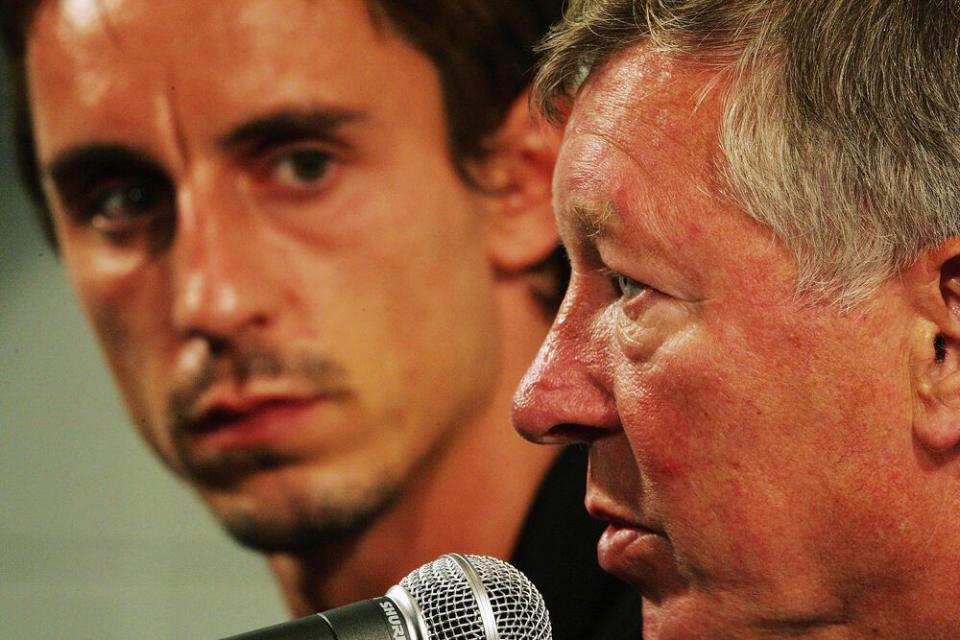
AC: Do you think it weakened you as a pundit? Klopp has had the odd pop at you, and I guess managers are thinking why should you criticise them when you failed doing their job?
GN: What I say to that is that a great chef knows how to cook a fillet steak amazingly. I can’t cook like that, but I can eat it and I can be a pundit on that steak. I can watch a game and don’t need to be a manager to assess what I see. I have lived all my life in football. I can see where the game is being won and lost, see who is out of position, why a plan is working or not. Before I went to Valencia, everyone was saying Gary Neville is the best pundit in the country. When I come back, I actually have more experience, but all of a sudden I’m not good any more.
AC: Where does all your energy come from? I get the sense you have more energy now than ever.
GN: What choice do we have? You either put everything into life, every day, or you wake up and decide not to. Sir Alex made things simple. He said, ‘Gary, you are here because I have decided you have the talent and skill to be here.’ I say to people here, ‘You are good enough to be here, and I want two things from you: hard work and a never-give-up attitude.’ It makes it simple for me. He trusted my ability and I gave him everything. I still do that with people: work hard, never give in, roll with the punches.
AC: You mentioned Marcus Rashford. He is one of several footballers moving into the political and campaigning space. Is that a good thing? And is there a danger it takes him away from the core business of being a footballer?
GN: What he has done campaigning on food for kids is incredible, and he should keep doing it, but in a way that doesn’t impact his football. It is a question of balance. I started to set up businesses when I was still playing, but I never let it take me from my core activity. I think for 12 months or so Marcus maybe got the balance wrong, but he’s made some changes behind the scenes to remove some of the distractions. You could see from his post-match interview after scoring the winner against West Ham in October that he was back in a good place.
AC: The punches you took on Have I Got News For You were mainly about your work for BeIN Sports at the World Cup in Qatar.
GN: Qatar has become a toxic word for some people, but from my point of view, I have an ongoing relationship with the Middle East, with Qatar, and I will work with Qatar beyond the World Cup. I like the Middle East and I like Southeast Asia as regions. The thing that has placed scrutiny on these countries is football, whether human rights, women’s rights, workers’ rights, LGBTQ rights. We have arms deals, liquid gas deals; they own parts of the economy, Heathrow, the Stock Exchange, Harrods; the King takes money from them, the Conservatives take more money from Qataris and Russians than anyone. But the finger gets pointed at footballers and pundits to take this fight to these countries. ‘Stick to football’ is what they throw at me, Marcus, Gary Lineker. But football would seem to be the only thing to bring out these issues.
AC: So when Keir Starmer said he wouldn’t go to the World Cup…
GN: Keir has got to be Prime Minister in 18 months. I support him. When he says that, fine, but does that mean you cut all ties with the whole Middle- Eastern region, or with every country with poor human rights? Where do you stop? How do we feel about American gun control, or the changes on abortion, or the fact they electrocute people in some states? You have to deal with these countries, so don’t just point the finger at footballers. They are not the problem here. I will continue to be an activist for human rights and mental health, I will continue to fight the kind of people who talk about an ‘invasion’ of people fleeing war and persecution to get a better life. We have terrible human rights on that here in England right now.
AC: Lots of people must be urging you to get into this more, be a politician.
GN: Yeah, lots of people say it, and I am… what’s the word?
AC: Tempted?
GN: No. I am one of those people who thinks he can do everything. But I would have to give up everything else: commentating, give up business where there could be conflicts, such as with the public sector partnerships. I think there would be a lot of conflicts in my life if I became an MP. I want to support Labour because this government, whether with Johnson, or Truss, or now with Sunak, they really are not good for our country. I believe we need a change and I want to support Keir in making sure he is Prime Minister, help Labour get into power. It’s a nightmare what this government has been doing to the country, so yes, it is tempting in some ways to get in there, but the time is not now.
AC: Might there be a time?
GN: I don’t think so, Alastair. Never say never, but I am passionate about football, passionate about Manchester, passionate about my business, and I would have to give it up.
AC: Plenty of people have gone in and parked their business while doing it.
GN: Well, who knows? Are you going back in? You’re thinking about it, aren’t you? (Laughs.)
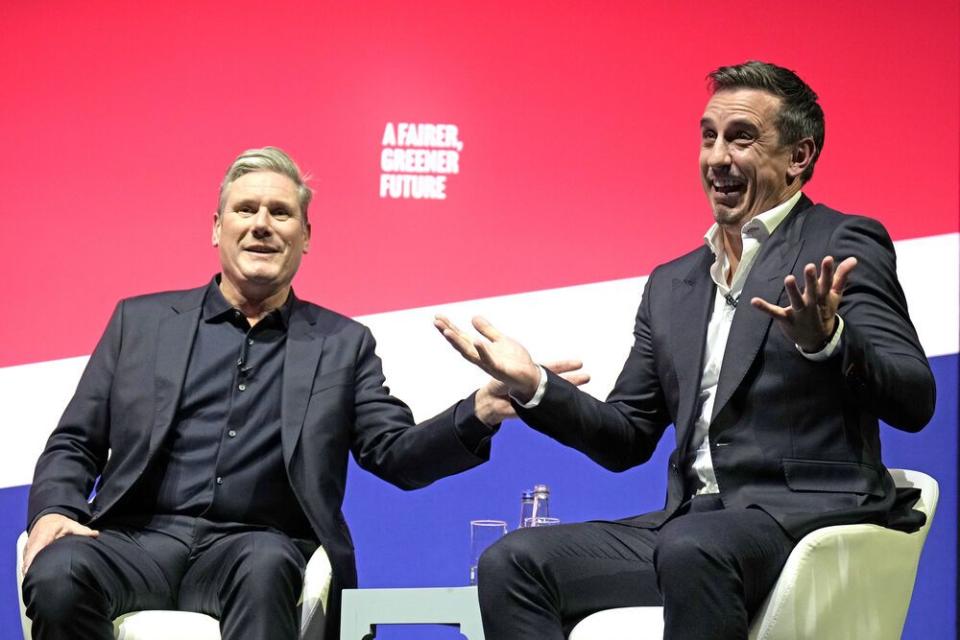
AC: We are in a similar place. I wake up every day in a complete rage at what these people are doing, and I am desperate for Labour to get back in.
GN: We are both very emotive about this, but there’s no need. Everything in government is failing, wherever you look. Transport, energy, health, waiting lists, immigration, even something like getting a passport, they [the Tories] are struggling to deal with anything. We are going to end up in a real mess, with lasting damage.
AC: Damage is already done. Brexit is doing so much damage.
GN: Brexit, Covid, the constant changing of Prime Minister. Just take football. The Fan-Led Review. It was a manifesto commitment. [Tory MP] Tracey Crouch did a brilliant job putting it together. Johnson said he would do it. Truss comes in and she hates regulation, so it’s dropped. Now Sunak comes in and it’s silence, no one knows what he thinks. People might say there are more important things than football – the economy, the cost of living crisis, Ukraine, Brexit – but why can’t they deal with more than one thing at a time? Football is a big part of this country’s life. This is a failing government, so we need to make a change.
AC: Are you surprised there isn’t more anger out there about how bad they are?
GN: There is anger out there. We both know a wide spectrum of people. There’s someone in my office, he has a fixed-term mortgage coming up [for renewal] and he’s worried to death. Last week I was with two Manchester property developers who said the interest payments on their commercial portfolio borrowing were sending them to the point of massive cuts and selling off assets. The Conservatives are now annoying not just the people we always knew they don’t look after, such as nurses and teachers, but they’re pissing off core supporters such as wealthy property developers, too.
AC: You have a bigger political profile than a lot of MPs, so how do you intend to use it for the next election?
GN: Social media is one of the things I can do. We’ve seen with the Republicans in the US and the Conservatives here that they are well-funded when it comes to data and analytics and the social engineering of people’s minds to get votes. I can spread the word of the genuinely bad job they do on a constant basis. You do the same. There are a number of others. It can have an effect. I will attend events with Labour politicians and make sure business understands these are sensible people, they’re not going to come in and tax at 60% or 70% and destroy inward investment. I sense that more and more people are trusting the shadow chancellor [Rachel Reeves], they are trusting Keir. The Conservatives are going to try and tell people that Labour will just spend more, put taxes up, be anti-business, but I can help reassure people that is not going to be the case. You worked with a Labour Prime Minister who was pro-business and pro-people. That is Labour again today, pro-business and pro-people.
AC: Have you become more political? What radicalised you?
GN: I’ve always been interested in politics, but it was [Matt] Hancock and Johnson at those Covid briefings. Out of their depth. Not telling the truth. And then Hancock says footballers need to do more, and I’m thinking: we’re talking young lads who grow up in places like Bury and Dudley, and who play for their country, and you want them to do your job for you?
Watching Johnson, Hancock, Sunak, Rees-Mogg, Dorries, Williamson, Raab, the lot of them, it was just a shambles. I know councillors, local politicians up here [in Manchester], and every one of them is better than the people we have in national government. And they have more integrity. It’ll be the same in Liverpool, Newcastle, Birmingham. When I think of people like [civic leaders] Howard Bernstein and Richard Leese and what they did for Manchester, or what [Mayor] Andy Burnham is doing now, or Birmingham and how they used the Commonwealth Games, they’re all doing good things in spite of the government, not because of it.
AC: You have seen Keir close up a few times. Do you think he has got what it takes?
GN: I do, because I ask myself: what am I looking for in a Prime Minister? I want someone who is stable, secure, balanced. I want someone who is interested in looking after all parts of the country, all sectors, all people. I want someone with integrity. I want someone with a bit of experience, and I reckon running the Crown Prosecution Service and being DPP [Director of Public Prosecutions] is that. He was proven in that role. Also, he seems to be someone who can talk to everyone, whether low-income families, business owners or the self-employed. He won’t alienate key sectors. And do you know something? We have to become one team again, stop all the dividing. Keir unites people. If he got into power, he would win more people over who maybe aren’t won over now.
AC: It is such a big swing, though, even if the Tories have been as bad as they have.
GN: I suppose the worry is if people think Johnson and Truss were so bad, Sunak must be good because he can string a sentence together. But he is not good. He reappointed [Gavin] Williamson. He reappointed [Suella] Braverman. He wasted billions during Covid. He carries a little more credit because people liked the furlough scheme, and it’s not hard to be better than Johnson and Truss. But people should not forget – he sat there alongside Johnson in Number 10 and defended him like his life depended on it. He only turned at the death when he knew Johnson was done.
AC: So you don’t see him winning?
GN: The seats up here that went from red to blue, it was all about immigration and Brexit. But how have their lives got better? They haven’t. The Conservatives have done so much damage. Johnson and the loss of faith over Partygate. Then Truss and Kwarteng and the damage of their mini budget. I cannot see places such as Bury and Bolton ever being blue again. They have to be red.
AC: Always a red.
GN: Always a red.
You Might Also Like


